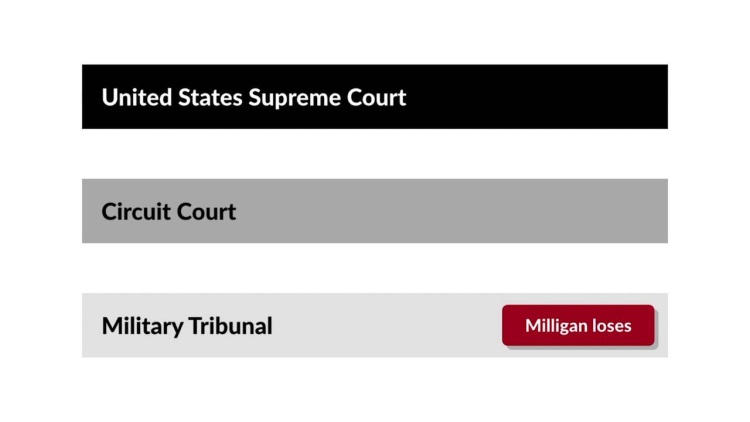Ex Parte Milligan
United States Supreme Court
71 U.S. 2 (1866)
- Written by Samantha Arena, JD
Facts
In 1863, in the midst of the Civil War, Congress passed a statute authorizing President Lincoln to suspend the writ of habeas corpus, conditioned on certain limitations. President Lincoln did so in September of that same year. The statute mandated that the secretaries of state and war must give to the circuit- and district-court judges a list of the names of US citizens held as prisoners, other than prisoners of war. If a grand jury did not return an indictment against a particular prisoner, that prisoner was to be brought before a judge for a decision of discharge or further action. Lambdin P. Milligan (defendant), an Indiana resident without a military background, was arrested in October 1864 by order of the commander of the military district of Indiana and imprisoned. Milligan was brought before a military tribunal, found guilty of various charges of conspiracy against the government, and sentenced to be hanged. On January 2, 1865, the United States Circuit Court for Indiana empaneled a grand jury, which did not return an indictment against Milligan. Milligan then petitioned the court for release, citing the 1863 statute and arguing that the military tribunal had no jurisdiction to try him.
Rule of Law
Issue
Holding and Reasoning (Davis, J.)
Concurrence (Chase, C.J.)
What to do next…
Here's why 905,000 law students have relied on our case briefs:
- Written by law professors and practitioners, not other law students. 47,100 briefs, keyed to 995 casebooks. Top-notch customer support.
- The right amount of information, includes the facts, issues, rule of law, holding and reasoning, and any concurrences and dissents.
- Access in your classes, works on your mobile and tablet. Massive library of related video lessons and high quality multiple-choice questions.
- Easy to use, uniform format for every case brief. Written in plain English, not in legalese. Our briefs summarize and simplify; they don’t just repeat the court’s language.





